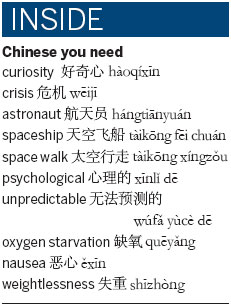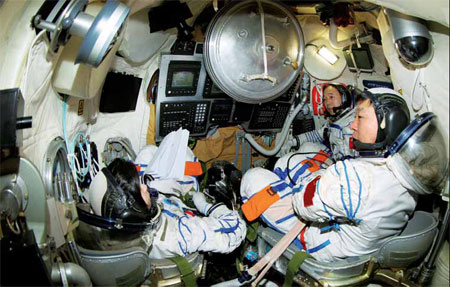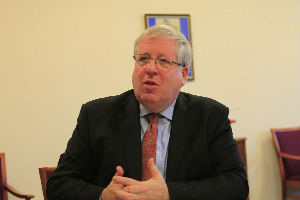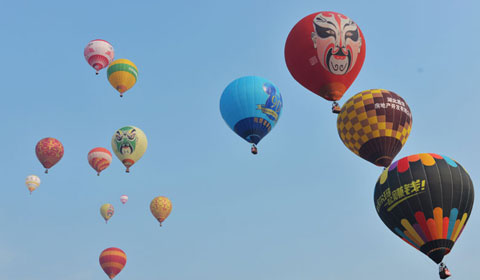How to be an astronaut
Updated: 2013-10-25 10:00
By Ginger Huang (黄原竟) (China Daily Europe)
|
|||||||||||
You have to suffer for the best view in the solar system 航天员是怎样炼成的?
On the voyage of human curiosity, astronauts stand at the forefront of human endeavor. They witness the wonder and grandeur of our universe with an unparalleled view. Amazing though it all is, their lofty position is high-risk and fraught with potential danger; being an astronaut is no easy ride.
So far, all the astronauts in China are commanders. Their main job is to bring the results back home, meaning that what the top brass are really looking for are super-pilots.
The physical requirements needed during an astronaut's screening are intensely rigorous and failure to meet any requirement results in immediate disqualification.
As a preliminary condition, prospects must be 25-35 years old. After years of rigorous training, commanders need to be at their absolute prime to fly. Height is required at 160-172 centimeters, with all candidates needing to weigh in at between 55-70 kilograms.
A family history of disease is a major concern. Candidates with three generations of certain major diseases in the family are disqualified. Large scars are also a big no-no, as they can bleed under the force of hyper gravitation. Consumption of alcohol, cigarettes, drugs and even a picky taste in food can all be major flaws.
Potential astronauts can even be barred for snoring - sound sleep is profoundly important to the busy astronaut. Finally, all candidates need to be able to speak articulate Mandarin without obvious traces of a dialect.
A further important criterion for Chinese astronauts is the functioning of the vestibular system, which contributes to our sense of balance and spatial orientation. A well-developed vestibular system makes one less sensitive to the discomforts caused by the alternating states of hyper gravitation and weightlessness. Tests for this include being hurled at high speeds on the end of a centrifuge's 8-meter arm.
Candidates are required to have excellent cardiovascular functions to survive in space, which is also vital in dealing with hyper gravitation and weightlessness.
Because a spaceship's interior creates a similar - but different - air pressure to that on earth, during space travel astronauts are liable to have symptoms similar to altitude sickness and oxygen starvation. Thousands of miles above the earth, this could be a major problem and relevant clinical tests are carried out accordingly.
Beyond the physical strains and requirements, psychological tests are also important. Space travel is a lonely, unpredictable journey that can strain even the most serene person's nerves to breaking point. The shuttle is a small, claustrophobic hell in the near vacuum of space, utterly discon nected from planet earth, with astronauts divorced from everyone they have ever known.
Couple this with the fact that any small malfunction or miscalculation could lead to death and it's a waking nightmare. Ground control is an important factor, but the stress of survival lies with the astronauts alone.
"Unless your nerves are extraordinarily tough, it would be impossible to complete your mission," says Zhou Qianxiang, professor at Beijing University of Aeronautics and Astronautics.
Apart from coping with claustrophobia, isolation and life-threatening emergencies, candidates also need to be prepared for the spotlight. An astronaut, who makes it to space, quickly becomes a public figure, even a national hero. After China's latest space mission, the Shenzhou X (神州十号 Shénzhōu shíhào) in June 2013, the three astronauts involved were received by senior government officials. Bland details of their life, such as whether they ate zongzi (粽子) or how they shaved, made national headlines.
"For Chinese astronauts, much of the pressure comes from being followed intimately, both by their superiors and the entire nation," says Wang Yanlei, an astronaut trainer at the National Astronaut Center.
To test their mettle, candidates take a psychological test, used internationally to evaluate mental vigor and personality. Potential astronauts have their family and friends raked over and interviewed. Any serious dirt on a candidate instantly disqualifies them.
When a pilot becomes a candidate, it takes years of training for them to "graduate". They will receive physical, psychological and survival training, not to mention the more obvious courses in astronautics.

When being shot into the sky, the spaceship accelerates to a speed of 7.9 kilometers per second in about five minutes, which puts the astronauts in a state of hyper gravitation. Even though when lying down, much of the blood in their body rushes into the legs. The g-force causes the body to weigh eight times more than it would on earth; the lack of blood to the brain causes many to black out entirely. As the shuttle launches, the vibrations are so fierce that all the organs in the body violently shake.
To counteract the mechanics of hyper gravitation, leg strength is specially trained to at least partially prevent the downward rush of blood. Centrifuge training is essential in causing resilience to some of the more adverse affects of being shot from the planet and into orbit. Accordingly, time in the centrifuge is considered the most painful part of all the training.
"Imagine being crushed under several times your own weight," Yang Liwei (杨利伟) said in an interview with CCTV. He was the first Chinese astronaut on a spaceship. "My face became distorted, tears ran against my will and the hardest part is that you cannot breath."
Astronauts are also trained in a hyperbaric chamber and receive five-day training in an upside-down position, during which time they still need to eat, drink and take photographs as usual. This is all key to make sure they can function in space.
In order to prepare the astronauts for the space walk, water tanks are used to imitate a weightless environment. In a water tank, the astronaut wears a special training suit that weighs 120 kg; the gravity is nullified by buoyancy. The astronaut can stay afloat and this creates an environment similar to life outside the shuttle.
When the ship returns back through the earth's atmosphere, the surface of the ship can reach thousands of degrees Celsius, and the inside of the ship, despite precautions, can still heat up considerably. When the capsule touches down, the astronauts are reintroduced to earth's gravity with a bang. In just a few days, they go from severe g-force and weightlessness, back to earth's terrestrial gravity.
And, while that's the end of the trip, it's not the end of the journey. In case astronauts are thrown off course and are not found for days, outdoor survival skills are also key. The spaceship carries supplies for the astronauts to last two or three days. The astronauts have to know how to survive a fall into the ocean, ice-capped mountains, deserts or even jungle. They are trained to be experienced outdoor adventurers, knowing how to hunt and fish, recognize edible plants, build temporary residences and defend themselves against pests and beasts alike.
The survival training is always carried out in extreme circumstances. For example, astronaut Li Qinglong was put on an icy plain in Russia and his assignment was to survive for 48 hours in the -50 C weather. His only food was two small cubes of biscuits. "We didn't sleep for two whole days. To be honest, I felt as though I was better off dead," Li said in his interview with Liberation Army Daily. He lost 2-3 kg in two days.
"I think the most important thing is a strong personality," Wang says. "When you are in space you have to deal with a lot of unpredictable things and you only have yourself to count on. You need to be mentally resilient, calm, concentrated and capable of working with others."
Courtesy of The World of Chinese,
www.theworldofchinese.com
The World of Chinese
|
Astronauts of Shenzhou IX are trained in the cramped re-entry capsule. Provided to China Daily |
(China Daily European Weekly 10/25/2013 page27)
Today's Top News
Mythbuster dispels fictions about China
Forum urges stableChina-Japan ties
NSA spying hurts US diplomacy
Carrier rocket sent to launch base for moon landing
Requirements cut for business startups
Study shows PM1 most harmful
Cold snap to sweep NE, N China
Paper apologizes for reporter's untrue stories
Hot Topics
Lunar probe , China growth forecasts, Emission rules get tougher, China seen through 'colored lens', International board,
Editor's Picks

|

|

|

|

|

|






